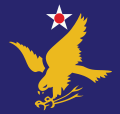54th Fighter Group  | |
|---|---|
 F-16 Fighting Falcon as flown by the 54th Fighter Group | |
| Active |
|
| Country | |
| Branch | |
| Role | Fighter training |
| Size | 800 people [1] |
| Part of | Air Force Reserve Command |
| Garrison/HQ | Holloman Air Force Base |
| Engagements | American Theater of World War II Pacific Theater of Operations |
| Decorations | Distinguished Unit Citation |
| Insignia | |
| 54th Fighter Group emblem [a] [2] |  |
| 54th Fighter Group emblem as originally approved [3] |  |
The 54th Fighter Group is an active unit of the United States Air Force stationed at Holloman Air Force Base, New Mexico and assigned to the 49th Wing of Air Education and Training Command. The group was reactivated in March 2014.
Contents
- Mission
- History
- World War II
- Cold War
- Present day
- Lineage
- Assignments
- Stations
- Components
- Aircraft operated
- Awards and campaigns
- See also
- References
- Notes
- Bibliography
- External links
The group was first activated as the 54th Pursuit Group during the buildup of the Air Corps just prior to World War II. It served in Alaska during the Aleutian Islands Campaign, earning a Distinguished Unit Citation. It then returned to the United States and served as a training unit.
The group was again activated in 1955 as part of Air Defense Command's Project Arrow, replacing the 500th Air Defense Group. It served in the air defense role until 1958 when it was inactivated.
The group was activated once again as a training unit for the General Dynamics F-16 Fighting Falcon in 2014. The group was part of the 56th Fighter Wing at Luke Air Force Base, Arizona until October 2018 when it was transferred to the 49th Wing, the host unit of Holloman.






